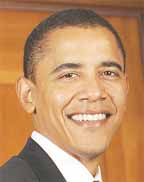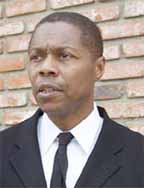Reprinted from the Trindad Review – December 1st 2008
By Cary Fraser
In 1963, the African American writer, James Baldwin, published My Dungeon Shook: Letter to My Nephew on the One Hundredth Anniversary of the Emancipation in which he wrote:
“Please try to be clear, dear James, through the storm which rages about your youthful head today, about the reality which lies behind the words acceptance and integration. There is no reason for you to try to become like white people and there is no basis whatever for their impertinent assumption that they must accept you. The really terrible thing, old buddy, is that you must accept them. And I mean that very seriously. You must accept them and accept them with love. For these innocent people have no other hope. They are, in effect, still trapped in a history which they do not understand; and until they understand it, they cannot be released from it. They have had to believe for many years, and for innumerable reasons, that black men are inferior to white men. Many of them, indeed, know better, but as you will discover, people find it very difficult to act on what they know. To act is to be committed, and to be committed is to be in danger. In this case, the danger, in the minds of most white Americans, is the loss of their identity. Try to imagine how you would feel if you woke up one morning to find the sun shining and all the stars aflame. You would be frightened because it is out of the order of nature. Any upheaval in the universe is terrifying because it so profoundly attacks one’s sense of one’s own reality. Well, the black man has functioned in the white man’s world as a fixed star, as an immovable pillar: and as he moves out of his place, heaven and earth are shaken to their foundations.”

Baldwin proved to be remarkably prescient as the outcome of the 2008 American presidential election unfolded over the course of the year. The election of Barack Obama to the Presidency has shaken America to its foundations. American politics stands on the cusp of a new era that will redefine both its social order and the role of race therein. Just as important, the incoming Obama administration marks the emergence of a generation of political leadership that will have to manage the recovery from the catastrophic mismanagement and chronic incompetence that have characterised the Bush administration and contributed to the most severe threat to the international economic order since the Great Depression. The end of the Bush administration amidst the collapse of Wall Street’s credibility in global finance, the accelerated decline of American industrial sectors exemplified by the state of the automobile industry, the ballooning fiscal and trade deficits financed largely by increased foreign borrowing and investment, and the military misadventures in Iraq and Afghanistan, have all resulted in a perfect storm for America’s short- and long-term economic well-being. Barack Obama’s promise of a decisive break with the image and substance of domestic and foreign policies under the Bush administration provided the rationale that led American voters to elect an African American as President for the first time in American history. The 2008 election is a watershed in American history and it is pregnant with new and previously unrealized possibilities for both America and the wider world.
In the American context, Obama’s victory is a signal that the Constitution which has been at the core of the American political project and which was constructed with considerable deliberation by the Founding Fathers — including George Washington, Thomas Jefferson, John Adams, and James Madison — continues to be reconstructed and renovated by successive generations of Americans. The original design had been shaped by the culture of plantation slavery that defined America at the moment of American independence in 1787. The early American Republic was the privileged province of property and white patriarchy, and the Constitution was shaped to institutionalize that reality. The original Constitution restricted the franchise to property holders; people of African descent were consigned in the vast majority to the status of slaves within the Constitutional framework. In legal terms, slaves were property and while not endowed with the right to vote, their owners were beneficiaries of voting rights by virtue of the property qualifications for the franchise.

In deference to the Southern states where life had become inconceivable without slaves, the American Constitution stipulated that representation in the Congress “shall be determined by adding the whole number of free persons, including those bound to service for a term of years, and excluding Indians not taxed, three fifths of all other persons.” Thus, for purposes of representation, a slave constituted three-fifths of a vote. The “three-fifths clause” allowed the Southern states to maintain a level of representation within the Congress that was out of proportion to the actual size of the white voting population in these states. In effect, the Constitution symbolized the triumph of plantation slavery over “freedom” in the shaping of American political culture and life as an independent nation. It was a political culture that was thereafter defined by a politics of exclusion of African and African-descent populations and the perpetuation of a “white supremacist” ethos as the cornerstone of American life. This idea of racial exclusion was best articulated by the United States Supreme Court in the Dred Scott decision of 1857 which ruled that:
“In the opinion of the court, the legislation and histories of the times, and the language used in the Declaration of Independence, show that neither the class of persons who had been imported as slaves nor their descendants, whether they had become free or not, were then acknowledged as a part of the people, nor intended to be included in the general words used in that memorable instrument.”

It is a remarkable irony that Barack Obama, as the descendant of an African who came to the United States in the 20th century as a college student, has become the 44th President of the United States. He is now the leader of a country that had been founded upon the idea that people of African descent should not hold citizenship. The irony is doubled when one takes into account the fact that his field of expertise is American constitutional law. One of the key tasks of his Presidency will be restoring “America’s moral stature in the world” – in large part by demonstrating respect for American constitutional doctrine and practices that signals a departure from the constitutional violations that have defined the Bush-Cheney administration in both domestic and foreign policies. Barack Obama, an African-American citizen, will be responsible for breathing new life into the American constitution some two hundred and twenty years after its promulgation and, in the process, help to reshape notions of American identity in a society defined by increasing cultural pluralism.
In terms of the wider world, Obama’s electoral victory poses a fundamental problem for all “Western” societies where history has been shaped by the legacies of African slavery and colonialism in Africa. Europe has also been the destination of African, Caribbean, Asian, and Muslim migrants for the last half-century and Obama’s election victory will inevitably pose the question: How many of these societies will demonstrate the maturity to provide such a powerful statement of the acceptance of cultural pluralism within their own political systems?
A similar question can be posed in Latin America where there has been a revival of the politics of indigenous communities in the Andes and Central America and a growing mobilization of African descent communities in Colombia, Venezuela, Brazil and other societies which share the legacy of African slavery in the shaping of the New World. For older societies, like India, where the growing electoral power of the “untouchables” has become evident, does Obama’s victory open the way for a rethinking of the politics of exclusion on grounds of caste? For the Middle East where there has been an ongoing struggle for representation among various Muslim traditions and communities within and across the boundaries of any single state, as well as among the different Jewish and Christian communities in the region, will Obama’s election in America require an ecumenical vision of the political order? For African societies, it is obvious that Obama’s rise to the Presidency will continue the process of soul searching about the politics of multi-ethnic societies in a context where South Africa as a model moves increasingly beyond the era of Nelson Mandela. In effect, Obama’s victory represents, at a global level, the expanded possibilities of multi-cultural democracy that redefines the context of majority rule in democratic societies.
In his speech at the National Constitution Center on March 18, 2008, Obama asserted:
“I am the son of a black man from Kenya and a white woman from Kansas. I was raised with the help of a white grandfather who survived a Depression to serve in Patton’s Army during World War II and a white grandmother who worked on a bomber assembly line at Fort Leavenworth while he was overseas. I’ve gone to some of the best schools in America and lived in one of the world’s poorest nations. I am married to a black American who carries within her the blood of slaves and slaveowners – an inheritance we pass on to our two precious daughters. I have brothers, sisters, nieces, nephews, uncles and cousins, of every race and every hue, scattered across three continents, and for as long as I live, I will never forget that in no other country on Earth is my story even possible.”
For how long will America and Obama’s experience remain singular? It is obvious that his electoral success was not based solely upon the African American vote but represented the emergence of a viable multi-ethnic coalition in which African Americans, whites, Latino/Hispanic voters, Asian Americans and other minority groups embraced Obama’s message of change to create the groundswell that led to his victory. In effect, Obama’s victory does not mean that America has transcended race. Rather, it signals that American politics has become the search for a new politics of race in which multi-racial coalitions are increasingly key to electoral success- especially at the national level. In that sense, the 2008 election is a watershed which has redefined the terrain of American politics and opened the way for a new political dispensation and a new social contract across the society.
For Obama and the leadership of the Democratic party, their challenge over the course of the next several years will be to institutionalize this new politics and to establish a political compact that would ensure the survival of a multi-cultural democratic order grounded in the traditions of constitutional democracy in America. Obama’s electoral victory may well presage a wider search for alternative visions of democracy to accommodate the population flows and demographic shifts over the past century which have created a world of increasingly diverse populations within the borders of existing states. Given the excesses of “monocultural” nationalism that have defined the 20th century, including the episodes of ethnic cleansing, genocide, civil war, Obama’s victory poses the question – is this experience transferable to other societies? Further, will this example set by Obama and America in 2008 rekindle the image of America as a progressive society that can serve as an example to the rest of the world and which will allow it to restore its moral stature after Bush’s misadventures that have sought to export American democracy through the metaphorical barrel of a gun?
This relationship between American domestic politics and foreign policy was key to Obama’s campaign strategy. His willingness to advocate an end to the American occupation of Iraq which was based upon his earlier opposition to the war in 2002, and his argument that the war was diverting attention and resources from pressing needs at home, struck a responsive chord in the American electorate. Similarly, his willingness to hold open the possibility to engaging Iran as part of a broader strategy of reshaping American policy in the Middle East and the Persian Gulf, even as he sought to reassure Israel of America’s commitment to its security, suggested a search for ways to distance future American policy from the absurd “War on Terror” pursued by the Bush administration. However, Obama may have to think even further about whether the pursuit of American military supremacy at a global level that defined the Bush administration is either feasible or desirable in terms of America’s engagement with the wider world. The misadventure in Iraq resulted from the Bush administration’s desire to impress the international community that America was prepared to engage in the unilateral pursuit of its strategic goals – even in violation of the UN Charter. The Obama administration will have to be cognizant of the concerns for collective security that have gained increasing momentum in the wake of the war in Iraq and it will also have to rethink the American culture of war that has led from the Cold War to the current debacles in Iraq and Afghanistan.
The strategic blunder that led to the Iraq war, if compounded by increasing military expenditures to perpetuate the culture of war under the guise of the “War on Terror,” will inflict further damage upon the American social fabric. The education system has become increasingly dysfunctional and needs considerable investment for its reform, and health care is becoming increasingly costly and scarce for many, including the veterans of the previous and current wars in which the US engaged. These long-term demands for social expenditures will be compounded by the growth in the elderly population that is expected to result from the retirement of the post-1945 “baby-boom” generation of workers with the attendant rise in costs for social security payments and health care.
In effect, the Obama administration will be confronted by the extraordinary challenge of reinventing the American social contract that has been shredded by the Bush administration in its preferences for policies that benefit the privileged, and its search for undisputed strategic primacy through the pursuit of pre-emptive war. In addition, the failure of successive administrations during the last four decades to address, over the long-term, the rehabilitation of the country’s infrastructure; the expansion and upgrading of its power grid; the more efficient use and diversification of its energy sources; and the application of effective oversight of financial markets- have all contributed to the growing urgency for the restructuring of the American economy. In an era where the dynamism of Asian economies pose a threat to America’s economic primacy that has underpinned the international political economy since 1945, the United States will have to display a strategic vision that will allow it to negotiate the current crisis and lay the foundations for longer term economic sustainability. The incoming Obama administration is facing the most serious political and economic crisis since the Great Depression and it presents an extraordinary opportunity for the first African American President to put his stamp upon the revitalization of the American democratic project in the 21st century. Success will be largely measured by Obama’s ability to transform his campaign message of hope and change into policies that restore American political self-confidence, consolidate the politics of ethnic and cultural pluralism as vital to the maintenance of a democratic order, and inject a renewed economic dynamism that allows America to remain competitive into the future.
Same day surgery
By Ewalt Ainsworth
The world has waited, Obama, a plural man is now in command
His traditions are not lofty, this we understand
Brace yourself, be your best self, pace yourself and stand
Yes we can join in the struggle to bring back dignity, courage and hope to the common man
In the ghettos, in the barrios, Africa , America, Asia and Afghanistan.
America has been gracious to all who live and dwell
But this bionic man whose ancestry from the bowels of Africa has created a ground-swell
He has sung a familiar refrain that we all know so well
Every citizen, every denizen, every child can tell
It is not about me…It is about you…ring the bell
Obama is a movement not a tenement
It is about the group collective and its upliftment
Obama will right side the global economy and bring good government
Obama will temper the wars and ignite a new commitment
This simple man will give us all hope, justice, peace, equity and equality under a global tent
Where Sunni and Shiia, Jew, Gentile and Rasta can rant and rave and vent
And reach a consensus for human dignity and development.
The road ahead is rough, the challenges many
Obama has become architect in chief of the floundering economy
He has assigned competent hands to redesign the face of humanity
To perform same day surgery
